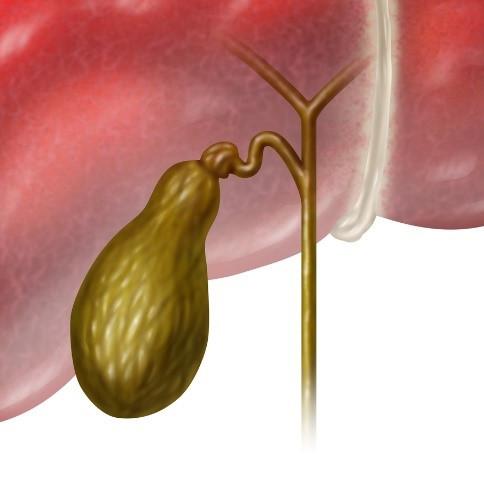Each year in the US about 750,000 cholecystectomies (gallbladder removals) are done, making it one of the most common surgeries.
It also happens to be one of the most unnecessary surgeries!
It is estimated that only a few thousand of the cholecystectomies that are performed each year actually need to be done.
That is largely because unfortunately, many doctors STILL believe that the gallbladder doesn’t serve much of a purpose, that you should be able to function just fine without it, and there is no other way to treat gallstones anyway.
All three of those statements are WRONG!
Here’s why:
Nature’s perfect plan
Your gallbladder and liver work together as a team.
About a quart of bile is secreted each day by your liver and gets stored in the gallbladder. While the gallbladder is holding the bile, it absorbs excess water out of it, making it more concentrated and stronger—to the tune of five to 18 times more concentrated!
Then when you eat a meal, the gallbladder contracts, and releases bile into the upper part of your small intestine.
The bile works like a detergent on grease—it emulsifies the fat, cholesterol and fat-soluble vitamins A, D, E and K in your food, and then your pancreatic lipases (fat enzymes) finish the job.
Then the bile gets absorbed through the intestinal wall and sent back to your liver to be reused—for up to 20 times.
Trouble brewing
The most common form of gallbladder trouble is gallstones, and currently, about one in five Americans over 65 have them.
But even though they’re common, they don’t just POOF! come out of nowhere.
Gallstones are most commonly the result of excess cholesterol in your bile and/or toxin buildup, which can be caused or worsened by things such as poor liver function, eating too many unhealthy fats (especially trans-fats) and refined carbs, waste buildup from poor digestion and damage to your gut (especially from gluten).
So in other words, gallstones are simply a result of things going awry in your body and/or your diet, and taking out your gallbladder doesn't change one iota of that.
As a matter of fact, it makes things worse.
Life after your gallbladder
Once your gallbladder goes to gallbladder heaven, it’s extremely difficult for your body to digest fats. This can cause burping, gas and bloating after eating.
You’re also very likely to be deficient in essential fatty acids and the fat-soluble vitamins A, D, E and K. This can, in turn, impair your brain function and your body’s ability to make hormones as well as compromise the integrity of your cell walls.
Lacking vitamins A, D, E and K can also hamper your immune functioning, impact bone health, and affect your cardiovascular and nervous system health.
In addition, you’re also more susceptible to chronic inflammation without the protection of anti-inflammatory fatty acids. Inflammation is a driving force behind most chronic diseases including cancer, heart disease, and arthritis.
Give them some TLC
Although surgery is unavoidable at times, fortunately, there is a lot you can do to help keep your gallbladder and liver working like they should:
1. Get testedA study published in The Lancet found that about half of the people with gallstones had low levels of hydrochloric acid (HCl). Your doctor can test your level of HCl with either a Heidelberg capsule test or SmartPill test.
A liver function profile can be helpful to see if there’s a problem with your liver.
Also, investigate food sensitivities. Studies have shown an association between food sensitivities and gallbladder disease.
2. Eat your way to healthy organsThis is crucial. NOTHING can undo the domino-like, health-wrecking effects of a poor diet.
Concentrate on fruits, vegetable, meats, poultry, fish, eggs and healthy fats.
At the same time, limit refined carbs and sources of gluten (like bread, pasta, and pastries, as well as processed foods) and avoid trans-fats at all cost.
3. ExerciseStudies show that as many as 34 percent of cases of gallbladder disease in men could be prevented by increasing exercise to 30 minutes, five times per week.
Get your doctor’s OK and get moving.
4. Flush out your liver
Every morning drink a large glass of room temperature water to which fresh lemon juice or apple cider vinegar has been added.
Look for “Fire Cider” if you can find it—it’s a tonic made from organic apple cider vinegar, honey and spices that is wonderfully cleansing. I take a shot every morning.
If you have gallstones
If you have been diagnosed with gallstones, note that many times they can dissolve on their own—especially if you help support proper gallbladder and liver function like I mentioned above.
Also, taking a digestive enzyme formula like Digestizol Max can be very useful in supporting the gallbladder.
Digestizol Max contains an effective blend of 15 natural, plant-derived enzymes that help your body break down all kinds of foods (fats included!) and help keep digestion more smooth and efficient.
In addition, eat artichokes and bitter greens like chicory, arugula, and radicchio. All of these may be added to a tossed salad.
If your gallbladder is already gone
If your gallbladder is already deep-sixed, it’s VITAL to not only support proper digestion with Digestizol Max enzyme supplementation but also to compensate for any nutritional deficiencies you are likely incurring.
Super Core multi-vitamin and mineral formula can help support where your body may be lacking in the fat-soluble vitamins A, D, E and K.
And VitalMega-3 fish oil formula can help ensure your body has the crucial omega-3 essential fatty acids you need to curb inflammation and support cardiovascular and brain health!
Take care of your precious gallbladder, or help compensate for it if it’s gone. I’m sure you’ll see a big difference in how you feel.
To your health,
Sherry Brescia












Janssen Cilag Priligy Dooste [url=https://bansocialism.com/]buy cialis online no prescription[/url] Zojegorelo Zithromax Powder For Chlamydia